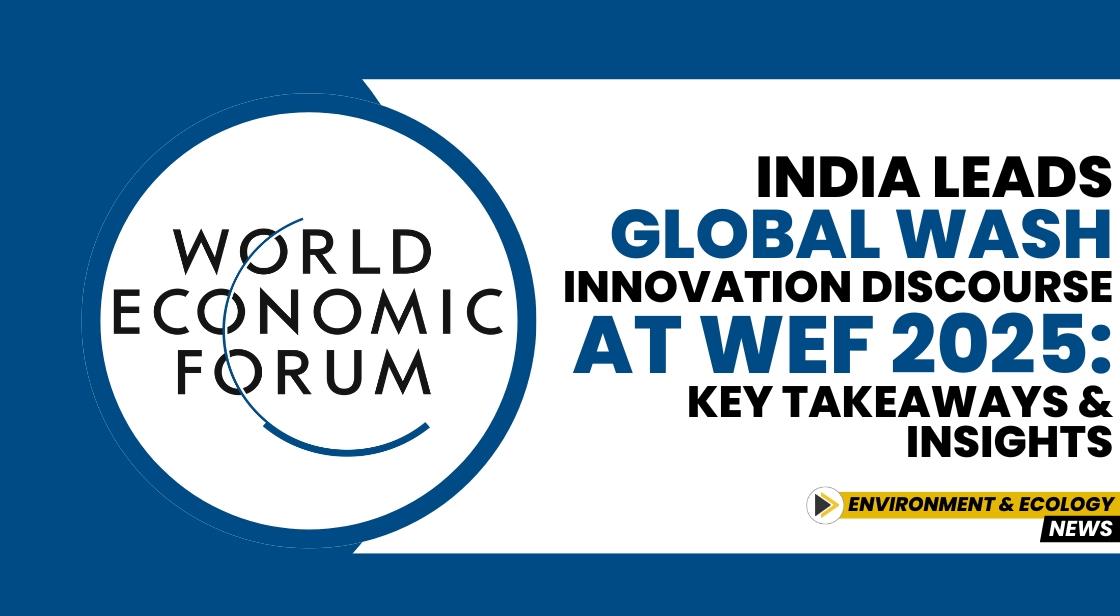India Leads Global WASH Innovation Discourse at WEF 2025: Key Takeaways and Insights

News Synopsis
During the World Economic Forum (WEF) 2025 in Davos, India took center stage as a global leader in water, sanitation, and hygiene (WASH) innovation through a prominent discussion hosted at the India Pavilion.
The session, titled “India’s WASH Innovation: Driving Global Impact in Climate and Water Sustainability,” showcased India’s transformative initiatives in WASH and their global relevance in addressing climate resilience and sustainable development challenges.
India’s Visionary Leadership in WASH
Union Cabinet Minister for Jal Shakti, C.R. Patil, delivered the keynote address, highlighting the remarkable achievements of the Swachh Bharat Mission (SBM) and Jal Jeevan Mission (JJM). These flagship initiatives have played a pivotal role in transforming sanitation and providing safe drinking water to millions of rural households.
Minister Patil remarked, “This marks a significant milestone, demonstrating to the world that under the visionary leadership of Prime Minister Narendra Modi, India is not only deeply committed to water conservation but is also driving a transformative revolution in this critical sector. We have made significant strides in strengthening our water resources, setting a global benchmark for sustainable water management.”
Tackling Global Water Challenges
Patil emphasized the urgency of global collaboration to address critical challenges like water scarcity, which is being aggravated by climate change, rapid population growth, and overuse of water resources. He called for unified international action to secure the planet's water future.
Reflecting on the achievements of the Jal Jeevan Mission, he highlighted, “In 2019, only 17% of rural households had functional tap water connections. Today, 79.66% of rural households under JJM have access to safe drinking water. This transformation is not just about water supply, but also about changing lives. Rural India now saves 55 million hours a day on fetching water, resulting in increased workforce participation, especially among women.”
Panel Discussions: Focus on Sustainability and Innovation
The keynote address was succeeded by two dynamic panel discussions:
-
“Bringing Global Impact in Water Sustainability”
-
“Innovation in Global Health Through Sanitation”
These discussions featured prominent voices from organizations like NMCG, UNICEF, WaterAid, the Gates Foundation, Riseberg Ventures, and actor-advocate Vivek Oberoi. The panels explored strategies to advance water sustainability and sanitation innovations on a global scale, sharing insights on scalable practices and inclusive models.
Showcasing India’s WASH Success Stories
India’s success in eliminating open defecation, constructing over 95 million toilets under SBM, and implementing widespread household tap water connections through JJM was prominently highlighted. These initiatives underscore India’s leadership in tackling water and sanitation challenges, offering a replicable framework for other nations.
Alignment with SDGs
Minister Patil highlighted India's significant role in advancing the United Nations Sustainable Development Goals (SDGs), with a focus on SDG 6 (Clean Water and Sanitation) and SDG 13 (Climate Action). He underscored that India's initiatives have enhanced public health and education, fostered economic opportunities, and positively impacted countless lives.
Public-Private Partnerships: Key to Success
The discussions highlighted the crucial role of public-private partnerships in achieving worldwide WASH objectives. India’s scalable models for sustainable water management and climate-resilient practices were highlighted as valuable blueprints for global adoption.
A Call for Global Action
The session concluded with a renewed call for global cooperation to tackle the ongoing water crisis, which poses a threat to health, food security, and economic stability worldwide. The insights shared during the discussions are expected to shape global strategies for water sustainability and climate resilience in the years to come.
Conclusion
India’s participation at the World Economic Forum 2025 in Davos showcased its role as a global leader in water, sanitation, and hygiene (WASH) innovation. Through groundbreaking initiatives like the Swachh Bharat Mission (SBM) and the Jal Jeevan Mission (JJM), the country has transformed lives, boosted rural economies, and made significant strides in advancing climate resilience.
Union Minister C.R. Patil's address and the insightful panel discussions emphasized the need for global cooperation and scalable models to tackle pressing water and sanitation challenges. India’s commitment to achieving Sustainable Development Goals (SDGs), particularly SDG 6 and SDG 13, has set a benchmark for other nations to emulate.
As the world grapples with increasing water scarcity, climate change, and sanitation issues, India’s innovative strategies and success stories offer hope and actionable solutions. By leveraging public-private partnerships and driving global conversations, India continues to inspire collective action, ensuring a sustainable and water-secure future for all.
This session at WEF 2025 not only celebrated India’s achievements but also paved the way for shared global efforts to address one of humanity’s most critical challenges—water and sanitation.
You May Like









